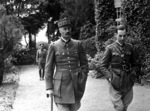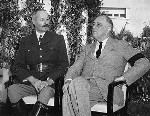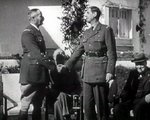Henri Giraud
| Surname | Giraud |
| Given Name | Henri |
| Born | 18 Jan 1879 |
| Died | 13 Mar 1949 |
| Country | France |
| Category | Military-Ground |
| Gender | Male |
Contributor: C. Peter Chen
ww2dbaseHenri Honoré Giraud was born in Paris, France. He graduated from the Saint-Cyr Military Academy in 1900 and served in French North Africa and then WW1 where he survived serious war injury. In the interwar years, he served with the French military in Constantinople and Morocco.
ww2dbaseDuring WW2, he led the 7th and then the 9th Army Group in defending the German invasion. He was able to delay German advance slight in the Netherlands but was not able to prevent his own capture by the enemy on 19 May 1940. He was kept as a prisoner of war at the Königstein Castle near Dresden. On 17 Apr 1942, he escaped from the castle and sneaked into Vichy-France via Switzerland. For the escape he became a target of German assassins, but his initial support for Philippe Pétain might have saved his life.
ww2dbaseOn 7 Nov 1942, he traveled to Algiers to meet with British personnel, who took him to Gibraltar to meet with Dwight Eisenhower. He was approached by the western Allies to assist in the upcoming Allied landings in North Africa (Operation Torch), but Giraud would only provide support if he was named the overall command for such an operation. François Darlan, who later cooperated with the Allies, became the High Commissioner of French North and West Africa, a position Giraud wanted had he cooperated with the Allies. On 10 Nov, he finally submitted himself to the Allies as Darlan's army commander.
ww2dbaseLess than two months later, 20-year-old Ferdinand Bonnier de La Chapelle assassinated Darlan, giving Giraud the opportunity to become the leader of the French in Africa. He received such a responsibility with Eisenhower's support. At this position, he became co-presidents of the Free French along side of Charles de Gaulle, though the more politically-minded de Gaulle continued to consolidate his own power at Giraud's expense.
ww2dbaseOn 13 Sep 1943, Giraud led the landings on the island of Corsica, wresting the control of the island from Vichy-France by aligning himself with the Communist rebels there. He drew much criticism by this action, and finally lost all political power to de Gaulle in Nov 1943. He retired from his post among the Free French as a result.
ww2dbaseAfter the war, Eisenhower wrote fondly of Giraud. "Giraud was my friend", he wrote. "He was a fighting man and thoroughly honest and straightforward."
ww2dbaseOn 28 Aug 1944, he survived an assassination attempt in Algeria.
ww2dbaseAfter the war he helped writing the constitution of the new French republic and wrote two books on his WW2 experiences. He passed away in Dijon, France, in 1949.
ww2dbaseSources: Crusade in Europe, Wikipedia.
Last Major Revision: Oct 2005
Henri Giraud Interactive Map
Photographs
 |  |  |
Henri Giraud Timeline
| 18 Jan 1879 | Henri Giraud was born in Paris, France. |
| 17 Apr 1942 | French prisoner of war General Henri Giraud escaped from his castle prison in the Königstein Fortress. |
| 26 Dec 1942 | Admiral Darlan was replaced as High Commissioner in French North Africa by Henri Giraud, who commanded the French army at the outbreak of the war, before being captured by the Germans, escaping and fleeing to Algeria. |
| 7 Jul 1943 | General Henri Giraud arrived in Washington DC, United States for conferences with President Franklin Roosevelt. |
| 13 Mar 1949 | Henri Giraud passed away. |
Did you enjoy this article or find this article helpful? If so, please consider supporting us on Patreon. Even $1 per month will go a long way! Thank you. Share this article with your friends: Stay updated with WW2DB: |
Visitor Submitted Comments
All visitor submitted comments are opinions of those making the submissions and do not reflect views of WW2DB.
» Operation Torch
» Casablanca Conference
- » 1,150 biographies
- » 337 events
- » 43,917 timeline entries
- » 1,241 ships
- » 350 aircraft models
- » 207 vehicle models
- » 375 weapon models
- » 123 historical documents
- » 260 facilities
- » 470 book reviews
- » 28,546 photos
- » 432 maps
General Douglas MacArthur at Leyte, 17 Oct 1944
Please consider supporting us on Patreon. Even $1 a month will go a long way. Thank you!
Or, please support us by purchasing some WW2DB merchandise at TeeSpring, Thank you!
30 Nov 2014 12:45:32 AM
After the Allied invasion of French Northwest Africa, the French Army was in such a state that it was unable to participate in either the invasions of Sicily or Italy. Eisenhower initially considered the French forces to be just one of many exiled European armies competing for American resources and, in addition, there were many others who were not convinced about the fighting value of French troops.
General Giraud wanted to reorganise the French Army into thirteen divisions, but shipping restrictions meant that the United States could only commit, at the Casablanca Conference in January 1943, to provide supplies for eleven. The first American supply convoy arrived in North Africa on 14 April and by July, 75,000 French troops had been equipped with U.S. weapons, uniforms and transport. However, in the meantime, de Gaulle's two Free French divisions had been steadily poaching recruits and had redeployed to Libya out of the way. Consequently Giraud was obliged to factor de Gaulles units into his plans, and this, together with a shortage of support personnel resulting in the disbandment of five divisions; thereby leaving the reorganised French Army with just eight divisions (including three armoured) to take part in the liberation of Europe. Two of these, the 1st Motorised and the 2nd Armoured were staunchly Gaullis units, while four others were composed almost entirely of colonial troops who were unaware of all the political manoeuvring.
Eisenhower, according to Captain Butcher, now decided that the rebuilt French force together with his American and British armies would provide a 'very considable investment' for the eventual defeat of Hitler's Germany. At the French Rearmament Ceremony, in Algiers on 8 May 1943, he warmly welcomed Giraud's forces and personally read out a telegram that he had received from President Roosevelt in which the American President praised French valour and patriotism, looked forward to the ultimate liberation of Paris and the re-establishment of a French Government 'in accordance with their own conception of right, liberty and justice.'